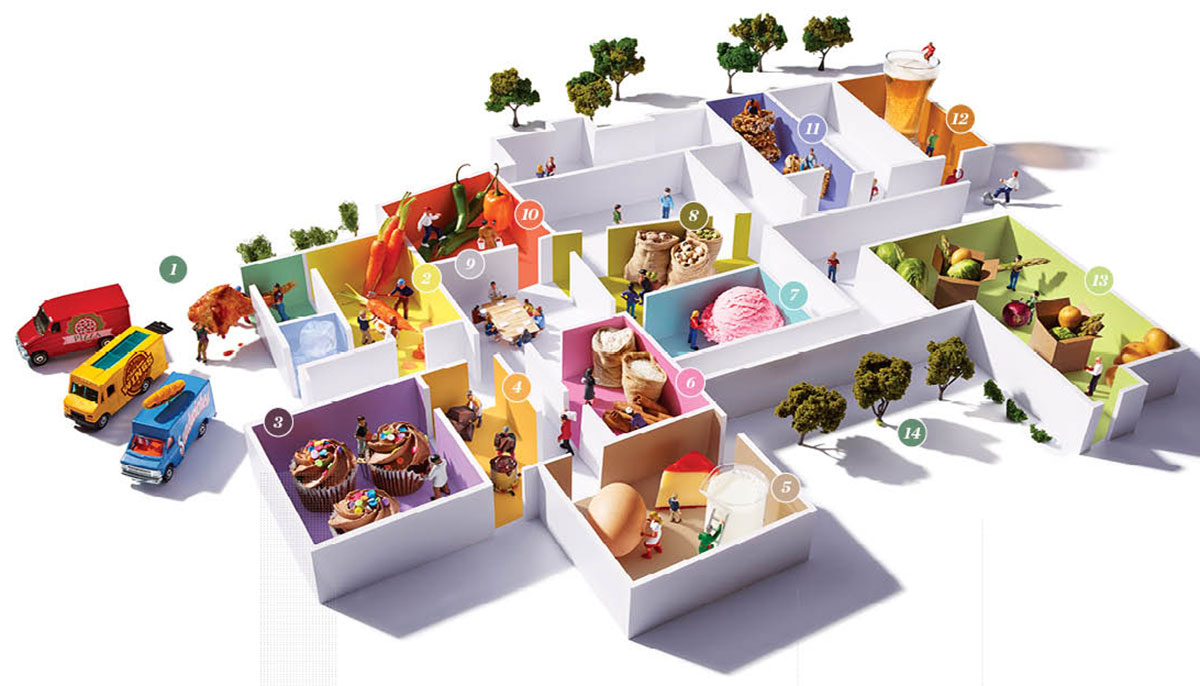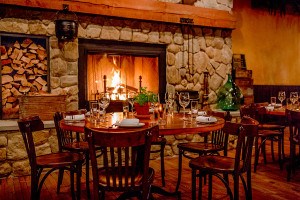The Collaborative Kitchen: Behind-the-Scenes at CropCircle Kitchen Pearl
For years, the 36,000-square-foot factory space on Quincy Street in Dorchester served as a production hub for cured and smoked meats (including everyone’s nostalgic favorite, the Pearl hot dog). As of this month, however, the building has been reborn as the Pearl Food Production Small Business Center, a $14.5 million high-tech culinary incubator where small businesses—makers of everything from allergen-free snack bars to spicy jerk chicken—will have access to the infrastructure and top-of-the-line kitchen equipment (about $840,000 worth) typically available only to large-scale companies. The facility, a collaboration between CropCircle Kitchen and the Dorchester Bay Economic Development Corporation, will function like a culinary ecosystem—one that’s estimated to create 125 jobs in the next three years. Here’s how it will all work.
1. Food-truck Central
Food trucks can plug in so their perish-ables can stay onboard overnight—no more lugging them off to a refrigerator. Potential clients include the Dining Car, the Cupcakory, and newcomer barbecue joint Lillian’s Smokin’ Rack Barbecue.
In the food-truck area, a Warewasher appliance can clean 24 sheet pans in a four-minute cycle.
2. The Commissary Kitchen
CropCircle Kitchen executive chef and director of operations Brad Stevens, an alum of Figs, Community Servings, and the Food Project, will command a kitchen staff tasked with making products for outside businesses—roasting tomatoes and creating butternut-squash soup from farms’ excess produce, for instance—among other projects. The staff will also eventually prepare fare for the food trucks using their recipes.
A Combi-Therm oven in the commissary kitchen can cook 200 pounds of pulled pork in a mere hour and a half.
3. The Shared Kitchen
Small businesses—like NoLa’s Fresh Foods, Fort Hill Jerk Chicken, and Deborah’s Kitchen—can rent shared kitchen space where cooking units anchored by dehydrators, ice cream machines, and more can be rearranged as needed in a plug-and-play style.
A $27,000 Baxter oven in the shared kitchen will be able to cook 40 sheet trays of cookies, cupcakes, or kale chips in one go.
4. Cold Prep Space
Attached to the shared kitchen, this room will allow for the creation of scent-sensitive products such as chocolate.
5, 6, 7, 8. Storage
Pearl clients use a centralized ordering system for cold, frozen, and dry goods, saving time and logistical headaches. The products, stored on pallets, will be checked in and out by designated Pearl staff.
9. Communal Meeting Space
RODE Architects, which revamped the whole facility, converted the building’s former meat smoker into podlike conference rooms where tenants can take phone calls or have meetings. A larger conference table will also facilitate intra-office collaboration.
10, 11, 12, 13. Separately Leased Space
Businesses that are too large for the shared kitchen (or, eventually, outgrow it) can lease private tenant space from Pearl. Tenants include hot-sauce purveyor Alex’s Ugly Sauce, which will produce micro batches and holiday specials in addition to its three current hot sauces (and go through about 5,000 pounds of hot peppers per year in the process). 88 Acres, meanwhile, will create its allergen-free granola bars in a private space in order to keep its production area clear of contaminants. And Just Add Cooking will package its signature boxed “meal kits” designed for home cooks. Additional spaces were still available as of press time; Pearl believes one is suited for housing a small brewery.
14. Gardens
The future may bring vertical gardens that grow everything from herbs to custom hops for Sam Adams.



